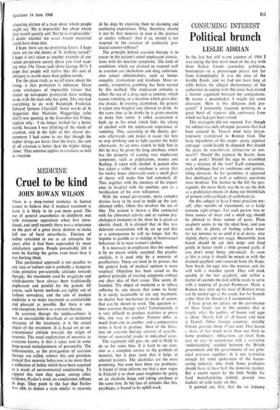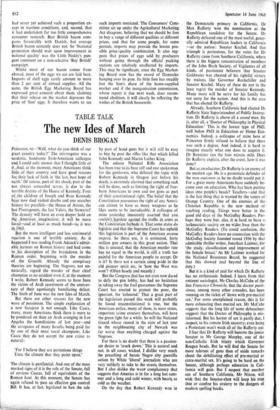Political brunch
CONSUMING INTEREST LESLIE ADRIAN
In the late but still warm autumn of 1966 I was taking the first main meal of the day with three Italian friends—journalist, politician, bureaucrat—in a picturesque piazza not far from Campidoglio. It was the time of the
terrible floods, and we had not been long at table before the alleged shortcomings of the authorities in coping with this crisis had started a furious argument between my companions. By nature a peacemaker, I sought for some diversion. 'How is this delicious dish pre- pared?' I innocently inquired, pointing to a great bowl of rigatoni anti carbonara from which we had just been served.
This stratagem did not succeed. For, though the subject was duly changed, passions that had been aroused by Tuscan mud were instan- taneously transferred to Roman food. The basic ingredients of the recipe—pasta, pigmeat and eggs—could hardly be disputed. But should the pasta be maccheroni, fettiuccine or ton- narelli? Should the pigmeat be bacon, ham or salt pork? Should the eggs be scrambled into a mixture of the two? Each component, each technique had its vociferous and gesticu- lating advocate. As for quantities, it appeared that ideological as well as culinary questions were involved. The further to the left the pro- tagonist, the more likely was he to see the dish as a proletarian means of eking out thimblefuls of protein with cartloads of carbohydrate.
On this subject at least I must proclaim my- self, after months of experiment, as a fairly extreme right-winger. For each person two or three ounces of meat and a small egg should be allowed to three ounces of pasta. Plain spaghetti seems to me the ideal base, and you cook this in plenty of boiling salted water for ten minutes or so until it is a/ dente, very slightly chewy and not soggy. Meanwhile, lean bacon should be cut into strips and fried gently in butter (with a little ground garlic if you don't mind being anti-social). As soon as this is crisp it should be mixed in with the drained spaghetti and removed from the flame. Now break the eggs into the mixture and stir well with a wooden spoon. They will cook quickly in the hot spaghetti, and within a matter of seconds the dish will be ready to serve with a topping of grated Parmesan. Many a Roman may turn up his nose (if Roman noses can be turned up) at the result, but for brunch rather than for breakfast I recommend it.
I have given no advice on the provenance of these foods—yet in this country that is largely what the politics of bacon and eggs is about. Nearly half of all bacon sold here is Danish. Other foreign countries, notably Poland, provide about 15 per cent. That leaves a share of not much more than one third to home producers. Allocations are fixed from year to year in accordance with a restrictive 'understanding' reached between the British government and the governments of our prin- cipal overseas suppliers. It is not restrictive enough for some spokesmen of the bacon- curing industry, who think home producers should have at least half the domestic market. But a recent report by the little Neddy for food manufacturing politely poured two buckets of cold water on this.
It pointed out, first, that the ux industry ; had never yet achieved such a proportion ex- cept in wartime conditions, and, second, that it had undertaken far too little comprehensive consumer research. Best British bacon com- pares favourably with Danish, but average British bacon certainly does not. So 'National promotion should wait upon improvement in national quality' was the Little Neddy's pun- gent comment on a non-selective 'Buy British' campaign.
Whilst most of our bacon comes from abroad, most of the eggs we eat are laid here. Imports of shell eggs rarely amount to more than 2 per cent of annual supplies. All the same, the British Egg Marketing Board has expressed great concern about them, claiming that their release on the market depresses the price of 'lion' eggs. It therefore wants to see such imports restricted. The Consumers' Com- mittee set up under the Agricultural Marketing Act disagrees, believing that we should be free to buy a range of different qualities at different prices, and that for some people, for some periods, imports may provide the lowest pos- sible price/quality combination. It also sug- gests that prices of eggs sold by producers without going through the official packing stations are relatively unaffected by imports. This may be significant, since the Egg Market- ing Board now has the sword of Damocles hanging over its pate. Its little lion has steadily lost the lion's share of the home-supplied market and if the reorganisation commission, whose report is due next week, does recom- mend abolition, it will clearly be reflecting the wishes of the British honsewife.











































 Previous page
Previous page